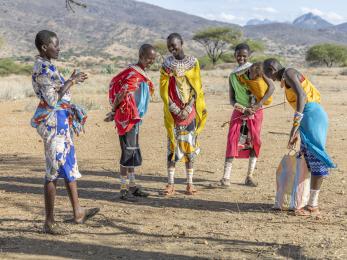Is RIPA-North transforming restrictive gender norms?

As part of its transformative gender agenda of resilience programming, the Mercy Corps-led RIPA-North programme used an approach of addressing restrictive gender and social norms which limit female participation in market opportunities, exclude women from having an active voice in community institutions, and undermine nutrition improvements. The approach, led by CARE International, is a process of Social Analysis and Action (SAA) in which participants in RIPA-North community and market platforms engage in dialogue with their communities to identify and ultimately address the restrictive norms.
This evidence brief summarises the outcomes from RIPA-North’s ‘Gender Outcome Mapping' Study, conducted in February 2023, which aimed to assess how communities themselves measure their progress towards gender equality. The findings indicate very positive signs of progress, with almost 75% of women reporting 'high' or 'medium' levels of change for all eight main categories of gender norm that pose a challenge for women's participation and gender equity.
Some of the key findings include:
The study shows extremely positive signs of progress in transformation of gender norms. More than a third of women (37%) reported ‘high’ level of change for all areas of enquiry except ‘aspiration for oneself’. Almost three-quarters of women (74%) reported ‘high’ or ‘medium’ change for all the eight ‘areas of inquiry’, which correspond to the different challenges women face In participation and gender equality.
For both women and men, division of labor and workload sharing, household decision making, and access to public places and services were the highest and most consistent areas of improvement.
Male and female reporting on change was broadly consistent, though men tend to report slightly more and faster progress than women do; on average, 50% of men scored progress as ‘high’ across the eight ‘areas of inquiry’, compared with 45% of women.
The most striking difference in perceptions of men and women was for ‘Aspiration of oneself’, where 66.7% of men perceived ‘high’ level of change whereas only 29.6% of women perceived the change as ‘high’. Men also perceived significantly higher change than women for ‘Division of labour and workload sharing’ and ‘Access to public places and Services’.

